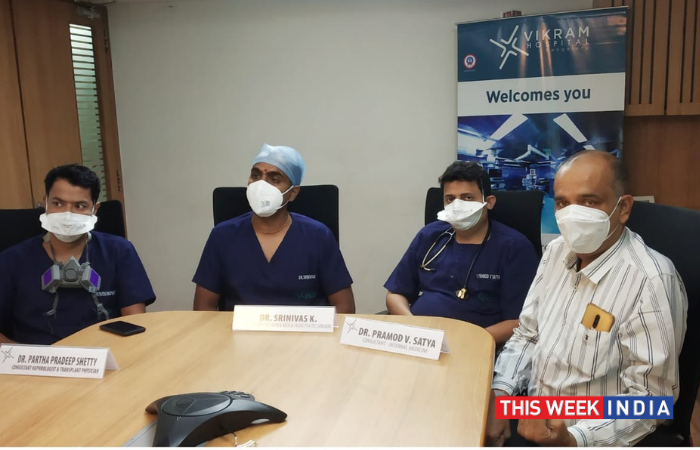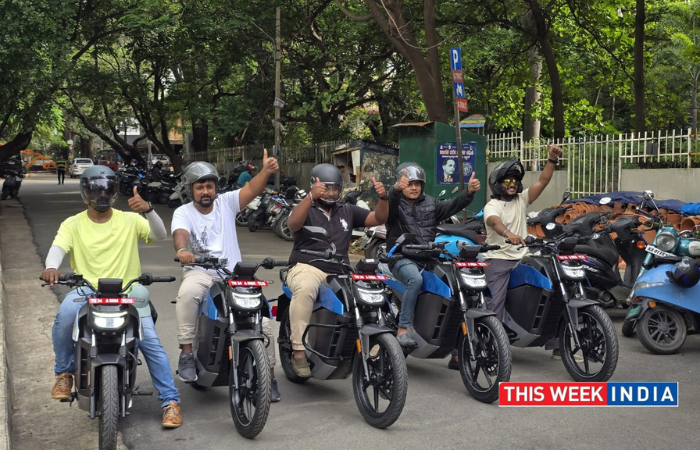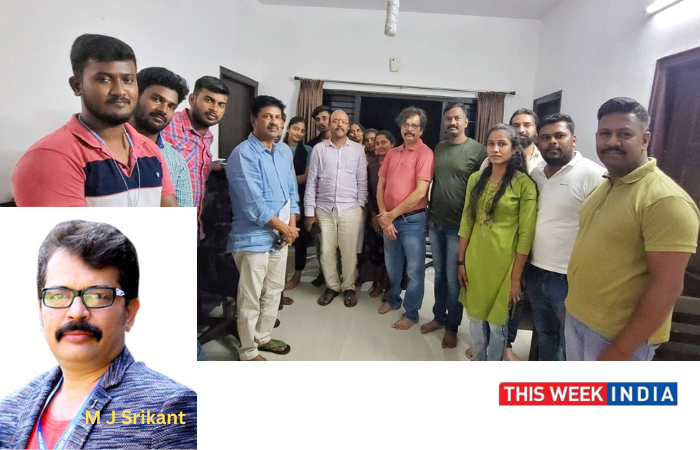About 400-500 patients have been detected with mucormycosis in Karnataka, due to which the disease has been declared as an epidemic in the state
Black fungus is a rare but serious and rapidly progressive disease with 50% mortality if not treated in time
BENGALURU / June 16, 2021: The Sars-Cov-2 delta variant not only has a 40% higher transmission rate compared to the alpha variant (which in turn has a 50% higher transmissibility than the original strain of the virus), it also causes a much more severe disease than alpha. This is leading to further rise in the percentage of positive cases that require hospitalization, even though the infection is in younger people. The delta variant causes acute and severe immune suppression and an acute hyperglycemic state, predisposing individuals to the risk of opportunistic infections like mucormycosis (black fungus disease), according to doctors of Vikram Hospital, Bengaluru (a unit of Manipal Hospitals). About 400-500 patients have been detected with mucormycosis in Karnataka, due to which the disease has been declared an epidemic in the state.
Said Dr. Srinivas K, Consultant ENT, Head & Neck Surgeon, Vikram Hospital, Bengaluru (a unit of Manipal Hospitals): “Mucormycosis, or the Black fungus disease, is a rare and rapidly progressive disease with high mortality if not treated in time. It usually occurs in people who either have health conditions like untreated diabetes or are taking medicines that lower the body’s immunity. The infection is caused by a fungus called Mucormycetes which lives in our surrounding environment. Its transmission occurs by inhalation, inoculation or ingestion of the spores. There are probable theories about its spread such as fungus growing on the walls, negative pressure rooms, water leaks, poor air filtration, building construction activities, etc.”
Said Dr. Pramod V Satya, Consultant – Internal Medicine, Vikram Hospital, Bengaluru (a unit of Manipal Hospitals): “Black fungus is very much treatable if patients take medical help on time, with typical recovery time being three weeks in early stages of the disease. They need to undergo complete and repeated surgical removal of the infected tissue from the affected areas and take anti-fungal medication in the form of Amphotericin-B. Since this disease is rapidly progressive and potentially fatal, our advice to patients is to consult an ENT specialist in initial stages of their course of symptoms. This is because early diagnosis and prompt treatment leads to a better cure rate and faster recovery.”
Talking about the kind of people at risk of black fungus infection, Dr. Partha Pradeep Shetty, Consultant Nephrologist, Vikram Hospital, Bengaluru (a unit of Manipal Hospitals) added: “Individuals who suffer from diseases causing suppression of one’s immunity are at the risk of black fungus infection. Uncontrolled diabetes is one of the most important risk factors. Cancer patients, dialysis patients and those undergoing treatment with corticosteroids also have a higher risk. Other risk factors include patients facing trauma or burns and those who have undergone an organ or bone marrow transplantation. Patients should be especially cautious if they have had a previous Covid-19 infection and got treated with steroids or Remdesivir or were administered oxygen therapy.”
The major areas of the body affected by black fungus include the small hollow spaces in the bones around the nose (paranasal sinuses), the nasal cavity, the palate, the skull base and the back wall of the throat from where it can spread to the eyes and brain. Other probable areas for infection are skin, lungs and the gastro-intestinal tract. Symptoms include facial pain, puffiness or swelling, eye pain, puffiness around the eyes, blurring of vision or double vision associated with a blocked nose, headache, tooth pain or swelling over the palate.
Said Dr. Srinivas K: “At Vikram Hospital, we have been treating cases of mucormycosis affecting the sinuses, brain, palate or the eyes. Most patients who come early to us for treatment have nasal symptoms and associated headache. They do well with timely surgical and medical management. Some patients come late when the disease has spread to their eyes, brain or the palate. They require a more tedious and extensive treatment with extended hospital stay. We have been seeing cases of both single fungus as well as multi-fungus disease. The other fungi apart from black fungus that we are seeing in patients include Candida albicans, Aspergillus Niger and Aspergillus fumigates.”
Vikram hospital doctors recommend that patients of black fungus go for endoscopic surgery wherever possible. “There are many benefits of endoscopic surgery compared to open surgery. It is minimally invasive, helps preserves organs and enables complete clearance of the disease. It also does not lead to any facial deformation or functional deficit,” said Dr. Srinivas K.









